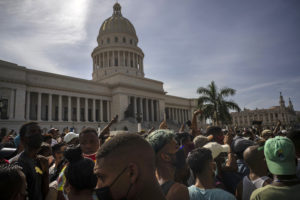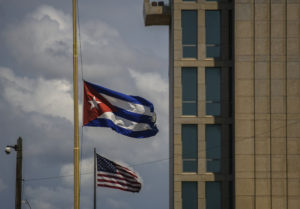By Geoff Thale, Program Director
On January 27 and 28, nearly all the presidents of 33 Latin American and Caribbean countries will meet under the auspices of the Community of Latin American and Caribbean States (Comunidad de Estados Latinoamericanos y Caribeños, CELAC) in Santiago, Chile. They will discuss regional integration, economic growth, and political issues, and they will issue a declaration at the end of the meeting.
It might sound like your standard presidential summit, with lofty statements about unity and economic growth. But two things stand out about this summit.
The first has to do with who will not be there. Neither the United States nor Canada is a member of CELAC. Neither will be present at the meeting. CELAC represents an effort by Latin America and the Caribbean to find a common voice and to do so independently of the two “giants of the north.”
That is a big deal. CELAC is a new organization—this is only its second year—so it does not have a long history, a permanent secretariat, or a staff. It is a fledgling. But it represents an effort by Latin American and Caribbean governments across the political spectrum to come together without the United States or Canada. CELAC has made it to its second year, and it has won enough respect that the European Union, which has held several previous summits with Latin American governments, is holding this year's summit under the auspices of CELAC. The EU-CELAC meeting, to be held January 25 and 26, will be attended by German Chancellor Angela Merkel, Spain’s Prime Minister Mariano Rajoy, and European Commission President José Manuel Barroso, among others.
The second has to do with who will be there. The meeting includes all of Latin America’s presidents from across the political spectrum. President Sebastián Piñera of Chile will host Brazil’s Dilma Rousseff, Mexico’s Enrique Peña Nieto, Nicaragua’s Daniel Ortega, and leaders from across the region, left, right, and center. For all their disagreements, the presidents will be sitting down together under the rubric of a new regional organization. Most tellingly, the country about to rotate into the presidency of CELAC is Cuba.
Cuba used to be an outsider, with few diplomatic ties in the Western Hemisphere and limited participation in regional forums. But that has changed. Today, Cuba has formal diplomatic relations with every country in the hemisphere except the United States. It is striking that while the United States will not be at the meeting in Chile, Cuba not only will participate, but also will exercise formal leadership. That is a major shift, the culmination of a process of Cuba’s regional reintegration.
The declarations made at this summit may not be the stuff of headline news. But who is there and who is not matters. The photo taken at the end of the summit will reflect the changing political dynamics in the Western Hemisphere. Latin American countries across the political spectrum are experiencing rapid economic growth, diversifying their trade relations, and seeking to define their economic, social, and development policies—as well as their international roles—on their own terms. CELAC and other regional bodies have emerged in a region where the Organization of America States used to be the only multilateral forum.
The big question is how the United States will handle this change. It cannot and should not return to the kind of one-sided relationship it had with the region in the mid-twentieth century. For the U.S. government to pursue legitimate national interests in the hemisphere—trade and exports, security, and diplomacy—it needs to reorient its relations with the region, change regional perceptions of the United States, and forge new partnerships that recognize the changing dynamics.
This will not be easy, and there is no single action that the United States can take to transform its relationship with the region. However, taking steps to end a 50-year effort to make Cuba a pariah state would be one helpful step in that process. This weekend, when the United States sees Colombian President Santos thanking Cuban President Raúl Castro for his help in launching peace talks between the Colombian government and the FARC guerrillas, it might consider taking Cuba off the list of state sponsors of terrorism as a sensible first step toward better relations in the hemisphere.
Geoff Thale is WOLA’s Program Director. Mr. Thale has studied U.S. policy toward Cuba since the mid-1990s and traveled to Cuba more than a dozen times, including organizing delegations of academics and members of Congress.
(Photo by Roberto Stuckert Filho)


